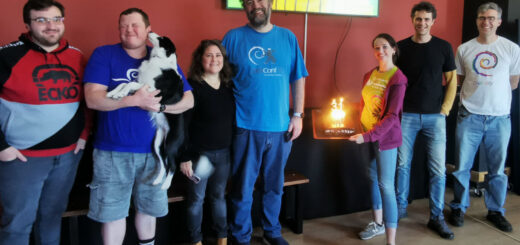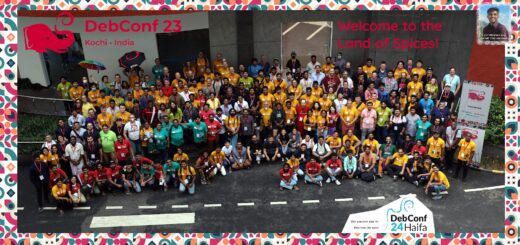The importance of saying “Hi”
Story time! (Warning: Ramblings and emo ahead)
The only white guy in the room
About two years ago, I thought that it would be a good idea to join the classes at the gym for group sessions rather than just doing all the solo stuff. I checked the available classes, and one class promised to be an extremely fun freestyling dance class (or something like that) with lots of cool music. In my head, that got translated to people doing breakdancing, there being like, a little moshpit somewhere, lots of hot sweaty girls jumping around and into everyone else… well, more like what you’d imagine in a club than at a gym :)
The next day I showed up for the class and just as it started I noticed that I was the only guy there. Besides that, the music was *very* female targeted. I think that’s the most Westlife, Boyzone, *NSYNC, etc (at least it was before Jonas Brothers were around) I ever had to hear in such a short amount of time. Also, there was nothing freestyle about it! It’s like they all knew very specific and elaborate dances and I couldn’t keep up at all and it was mostly embarrassing. Some might find it ammusing, but the most intimidated I’ve ever been was in a room full of women younger than me in (mostly) pink dancing clothes.
Quite often, I’ve been in situations where I’m at a meeting or gathering where I’m the only white person there. This might be when I visit a library in Khayelitsha to help them with their computers, or previously when I did some government work. I’ve never actually had a negative experience in cases like these, but sometimes you become a bit paranoid (and I’m not a paranoid person to begin with). Sometimes I’ve had thoughts like “I hope that comment wasn’t directed at me” and you tend to fine-comb everything that is being said.
When you’re the only one, or in a very small minority that is obviously different from everyone else there, you naturally become a little bit more sensitive. I guess it’s just human nature.
In the late 90’s and early 2000’s, e-mail was a great way of communicating and staying in touch. I also found mailing lists quite handy and learned that because people can’s see and hear you directly, that it often happens that people read it incorrectly, and what might seem like an innocent message may be interpreted as hostile to others. I learned to keep my messages as short as possible and keep the tone as neutral as possible, especially on mailing lists and messages that are sent out to many different people. This didn’t work so well at work though. I’ve had collueges complain before that my e-mails are too formal, and that it makes them feel uncomfortable. It was even mentioned in a performance appraisal on year! I learned that some people, it seems especially extroverts (in the Myers-Briggs kind of way) are much likely to respond faster if you through in a joke or perhaps even mention something non-work related. My style of e-mail drastically changed depending on who I sent it too, and people were generally more happy with me. I drew the line when our marketing person told me that it’s become company policy to send out all e-mails in the font “Arial”. I told him that he’d have my resignation before I ever send out an e-mail in Arial which resulted in a bit of an arguement. He didn’t take it too well. While I didn’t succeed in changing the company policy (I had too many other things on my plate at the time to worry about that) regarding the Arial e-mails, we ended up at least getting permission for our team to send out our e-mails in plain-text.
For some people, receiving an e-mail with formal style and wording is perceived as a kind of passive-aggressiveness. For some people, sending out what is really just a text message in HTML (and especially with a font like Arial) is perceived as clean and proffessional, where anyone with some technical skills will dismiss it as being wasteful and stupid.
Saying Hi
I’ve often heard people (and more women than men) complain that their boss isn’t polite enough. It’s usually something like “When I used to work at Company A, our boss would always come into the office and greet everyone and once a month he’d get everyone together in the office and we’d eat some cake and he’d provide us with some motivation”. In one office space I worked in, our manager was specifically very quiet. It was sometimes so quiet in the office that it made lots of people (including myself) very uncomfortable. Most of the time it didn’t bother me so much, but in that extreme case I could understand what the other people were on about, who were more vocal about the problem. He later had some bad performance reviews from people complaining about his leadership style and he left. He actually did a really good job, his biggest failure was really not saying “Hi!” and “How are you doing?” often enough.
When you’re in a leader position, or a high profile person, people look up to you and they want guidance and reassurance. It’s why we have phenomenons like Bradgelina (the combined name for Brad Pitt and Angelina Jolie) who some people obsess about. When you’re such a person, the slightest negative or positive thing you say can have a *huge* impact on all of those who follow you. I don’t think these people should censor themselves, but they should actively keep in mind that their word hold lots of weight, and that they should use them responsibly.
Mark and the girls
I read on Matt Zimmerman’s blog entry “Explaining to the Girls”. It’s about a comment Mark Shuttleworth gave at LinuxCon I got the video from a comment and his exact words were “If we can really approach it from the perspective of saying how do we make this just awesome for users, then we’ll, uh, we’ll have have less trouble explaining to girls what we actually do”. If I personally heard it like that for the first time, I would certainly interpret it as a very sexist remark. Someone mentioned that he actually meant it as “the girlfriend” or “significant other”. After listening to it again today, I can see how he probably just meant that.
Mark reminds me of that manager I had that didn’t say hi to the other employees. It’s not that he’s a bad person, but I guess it’s kind of hard to dedicate some brain CPU cycles to consider others when you have billions of dollars in the bank to worry about, when you get to travel by personal plane, when you get to take on huge projects such as Ubuntu, etc. When you get to that stage I think you just live on an entirely different level than most other people. What might be a big deal for most becomes trivial and unimportant, the set of problems you have to deal with changes and are on a totally different scale.
I think what he said was quite insensitive, regardless of his intentions. I can imagine a young woman who might have given up a more comfortable career to risk working exclusively on free software, doing the effort to come to LinuxCon just to hear that girls are slow to understand stuff. If Mark just said “We’ll have less trouble explaining what we do to our significant others”, it would already have been a major improvement and he’d also be able to get his message accross better. In my opinion it will probably do Ubuntu some good if he at leasts makes some kind of public statement about this.
From my perspective, it comes back to saying hi, or perhaps more specifically, acknowledging people. Once you’ve done that it’s already easier to keep them in mind and not saying things that are mean and insensitive.








hi brother
hi sister
hi fellow
you pray in the desert-yard like a church speaker
amen
this is a very good post, thank you :)
Very insightful post. Just a couple of things:
“Someone mentioned that he actually meant it as “the girlfriend†or “significant otherâ€. After listening to it again today, I can see how he probably just meant that.”
Even if that’s the case (and it probably is), it’s still problematic, because it relies on the assumption that the ‘we’ he’s referring to – which, in context, was ‘open source developers in general’ are male, because the use of ‘girls’ to mean ‘(potential) significant others’ only makes sense in that context. It implicitly excludes straight women from the ‘knowledgeable open source developers’ group, because for a straight woman to have trouble ‘explaining what she does to girls’ in this way wouldn’t make any sense.
Also, the accepted form of the word is ‘Brangelina’, not ‘Bradgelina’. :)
Let me get this straight: You think Mark is quite insensitive, yet you assume “I think you just live on an entirely different level than most other people” and stereotype him.
Wow. Way to commit the crime you are upset about.
Hmm… Last time I checked, a far larger part of women knew shit about everything technology-related than men. I’m quite sure it’s far more likely you’ll have trouble explaining to a random female what we’re doing than to a random male.
Of course, a public statement still wouldn’t hurt.
Last time I checked, a far larger part of women knew shit about everything technology-related than men.
Hm. I’m guessing that the last time you checked was around 1971. And it was a pointless and silly “observation” then, too.
I’m quite sure it’s far more likely you’ll have trouble explaining to a random female what we’re doing than to a random male.
I’d bet cash money I couldn’t explain too much to you.
Good post, Jonathan. It baffles me that there are so many people who, when told that there’s a level of participation by women in “free” (heh) software development that’s a full order of magnitude lower than in the proprietary world, give you this blank look and go, “Uh huh. And…?”
I liked both the emo warning and the emo content =) Thanks for writing about something that is all too often swept under the rug because of politics and personalities. Good coffee reading this morning.
Appreciate the post, however, it’s important not to present an excuse for behavior which appears sexist, regardless of its intentions. Whether or not he lives on a different planet and has billions of dollars is irrelevant. We live on this planet, and having billions of dollars doesn’t grant someone the privilege of ostensible discrimination. Quite frankly, it seems unproffessional and bush-league to be making such comments at a professional conference, regardless of the infringements upon the human rights of others.
Nonetheless, the fact that these comments were made is not what is the biggest issue here. The main issue is not admitting your mistake, apologizing, using the situation as an opportunity to shed light on discrimination, and moving on. This is an amazing opportunity for Mark to welcome more women into free-software, but, a the most visible figure, he needs to spearhead that dialogue.
We are an imperfect species, and Mark is not any less of a person for being one of us. But when you don’t admit to your imperfections, you appear weak and afraid, and that is not good for the Ubuntu community. Again, this type of episode makes ubuntu look bush-league and not ready to sit at the ‘adult’ table with proprietary folk.
While it often sucks that we make mistakes, I don’t think anyone cares as long as we fess up, ask for forgiveness, and move on.
@Bmidge I agree with what you say, although it wasn’t my intention to excuse his behaviour, but an attempt at trying to understand it.
I also agree that he’s in a very good position to spread awareness and make some good come out of this.
I really like that you started off this post with an example of how you felt when you were the minority in the room. I think that frequently understanding this feeling is what is lost on a lot of folks. It’s really not just a matter of “just jumping in to f/oss and doing work” for a lot of people, situations can be very scary and uncomfortable when you’re a minority.
Jonathan, interesting post. You highlight a great issue that many persons wish to ignore, that of ableism. Many of the persons that do not say hi or avoid social interactions with others suffer from extremely debilitating emotional or mental conditions, such as Social Anxiety Disorder. The fact that persons with such disorders can be run out of their jobs, and have their livelihoods threatened is really repugnant.
Perhaps one day [so-called] “normal” people will at least *try* to understand the harm that they cause to differently abled persons and stop marginalizing them. But based on the rampant ableism that keeps coming up in the workplace, and the lives that are ruined and the poverty that differently abled persons are continually forced into, I’m not holding my breath.
Until then all we can do is continue to offer differently abled persons a safe space to express themselves and eek out a living.
“sending out what is really just a text message in HTML (and especially with a font like Arial) is perceived as clean and proffessional”
Being the obviously sensitive guy you are :-) it might help to realize that many Windows mail readers render plain text in Courier New by default. It’s one of the most horrible fonts to read when printed, the characters are too thin and the text comes out very light. If you photocopy the page it gets even worse.
It’s like getting a typewritten letter from someone who’s too cheap to replace their worn-out ribbon.
“Many of the persons that do not say hi or avoid social interactions with others suffer from extremely debilitating emotional or mental conditions, such as Social Anxiety Disorder.”
As someone has been exactly like this for most if not all of my life, having been diagnosed with Asperger Syndrome since childhood and suffered a bit in the workplace because of it, I have this to say : no matter what you do in life, no matter who you associate with, where you work or whatever, you will always contend with these personal issues. And trying to ask people to be accommodative of these issues, if they are solely mental and not truly disabling, will ultimately fail because you must learn and grow. At the end of the day, no matter what we call these syndromes, they are personality defects, or egos. Dealing with these egos through self-observation of the negative effects they bring upon your being is part of the human experience. Real change must come from within, the world will not change for you and never will… because in reality, everyone is messed up in the head, not just the few we label with syndromes, and only a few people are truly selfless and have absolute mental clarity.
Those with Social Anxiety Disorder must ask themselves : why do they not want to socialize? Do they not want their feelings to be hurt through a hostile response or rejection? And what are these feelings really… their *pride*? Pride is something that should not be protected as a disorder or syndrome, it is selfishness rightly condemned. Us humans are not so great that we should think we’ll always have the right answers and responses ready, we need to get over and become free from the “myself”.
In a perfect, kind world, that quiet manager would have kept his job and people wouldn’t have weird hang-ups over things like e-mail fonts, or take every single thing personally. Guess what kind of world this isn’t?
Daniel,
I appreciate your comments. As someone that has had to watch the terrible treatment of persons with Asberger Syndrome, Autism, Bi-Polar Disorder and many other psychological, mental, and emotional conditions, I empathize greatly.
Perhaps in cases from your personal experience it is a result of pride, but I’ve known many others who suffer for a variety of reasons. Sometimes abuse has led to emotional difficulties, something chemical imbalances, sometimes persons are sensitive to certain frequencies (science is now beginning to examine these), and some simply have conditions for reasons we’re not able to pinpoint just yet.
While there are treatments, and sometimes medications, that can help in many circumstances, changes often take years. Growth that you speak of really requires patience of family, workmates, friends and of course medical professionals. For someone to be fired from their job for not saying Hi or not being at home in social situations is appalling.
Rather than taking the path that such conditions are the fault of the individual and believing that the rest of us should not be considerate, and firing such persons, and ruining their lives and livelihoods, at least those of us that are talking about being more diverse should be considerate.
A first step is to stop using these conditions as terminology for insulting language. In discussions that have come up recently about marginalization of women in the Free Software community, I watched with disgust as those opposed to women in free software (or those disagreeing with the belief that they were marginalized) were referenced by such marginalizing terms as retarded, crazy, insane, dumb and others.
Such terms do not marginalize the person that is they are attempting to answer or insult. Rather they marginalize differently abled persons. What they’re saying is, they are going to insult a person by referring them as these [so-called] “lesser” persons or [so-called] “other” persons. It’s othering language and marginalizing language at its worst.
So it’s not enough to say that society will never accept everyone. Rather, we have to stand up against ableism. And it’s honestly really disingenuous when someone is opposing one form of othering and marginalization by using another form of othering or marginalization, which seems to happen nearly every time these discussions occur. Yet those that practice ableism ostensibly in defense of any other ism (racism, sexism, classism, etc) will try desperately to sweep the discussion of their ableism under the rug, which is bad enough. But then *continue* to use ableist terms. This really shows their ableist privilege.
That is why I am glad Jonathan brought up the topic of Ableism (perhaps without intending to do so) because maybe FINALLY those that are suffering *intense* prejudice to the point of losing jobs, families, homes, and facing threats of physical aggression and violence, can begin to have their voices heard in the Free Software Community.
But as I said earlier, based on the extreme prejudice, othering and marginalization that Ive seen even from those that are themselves marginalized in some form or another (no matter how great or slight the marginalization) against differently abled persons, I’m not holding my breath for the change. All that we can do is keep exposing the terrible circumstances they find themselves in, and offer them a voice and comfort ourselves.
@Daniel, Thanks for this post, it’s my favorite one I’ve read throughout this whole blow-out. What I most appreciate is your understanding that we are all “messed up” in one way or another. I am an enthusiastic ubuntu user and believe deeply in the philosophy of FOSS, but I am not part of the development community. Professionally, I am a psychotherapist, and one of the most important things I learned through my experience is exactly what you stated. We are all crazy, but the really crazy folks are those that don’t admit to it or haven’t realized it…yet. I think it’s hard to come to terms with the fact that we are made up of just as much good and bad parts as the people we point fingers at.
We do indeed often act out of selfish motivation, and our disabilities do often serve a covert purpose for our selfishness. Of course, this doesn’t mean that we shouldn’t be as empathetic as possible to each individual’s lack of ability. But neither should we simply allow it to provide rationale for stagnation.
Many, including yourself, based upon your post, are forced to recognize this crucial piece of reality because it stares them in the face everyday. In the spiritual sense this is an ironic gift, albeit a challenging one that I will not pretend to truly understand. As for myself, I unfortunately forget about my imperfections too often and find myself far away from the reality you describe, left with a long journey back there.
In the end, however, there is no getting around this issue. We do have to face these unfortunate imperfections in ourselves, in this case, our own sexism, but there is simply no defense for it that is adequate.
Really enjoyed this post. Very thorough.
Re your comments on social interaction. I’m on the other side of the fence – an extroverted guy in a leadership position. The typical workplace is definitely biased towards the confident extravert, unless you’re in a specialist position and keystone to a company.
I spend a lot of my time trying to enable introvert specialists (in this case research specialists and data analysts) to get their points across. It is quite insane that the confident extroverts in our company can talk rubbish confidently and get their ideas adopted, whereas sensible introverts struggle.
I’ve frequently wondered about what makes a socially competent extrovert. I’m beginning to think that it is simply trust of people and their agendas. The reason – all my introverted friends are extroverted amongst people they know and trust.
Great post, thanks!
I thought it was referring to the stereotype that nerds are socially awkward with girls because they talk about technical things. I thought the target audience that should feel targeted is me ;).
While I’ll take your word for it that “saying hi” is important, that still doesn’t really get me any closer to understanding how to actually do this. Part of the problem is that I don’t identify at all; when people “say hi” to me, I find it completely awkward / irritating / alienating; as such, when I’m trying to do the same to others, I have no internal measure of whether I’m actually succeeding or not, and it usually seems like I do more “damage” than if I just avoided making the attempt in the first place.
It seems like people don’t understand how confusing / difficult this is for people like me; I can’t make any sense at all out of what Daniel says further up, for example. I don’t avoid social interaction (people who know me can attest that I’m a pretty intensely social person, despite the difficulties I have with social interaction), and I’m an ambivert; the problem is just that I don’t understand the forms of social interaction that are being discussed here at all.
Regarding Mark’s comment: I don’t think a joke that invokes gender stereotypes is necessarily sexist. In the same way, there are “good” jokes about race (racial) which make us laugh at ourselves and how we see the world, vs “bad” jokes about race, which are ‘racist’.
There is an existing stereotype of ‘geeks & girls’ and how they relate to each other. I see nothing wrong with making jokes about this or writing entire sitcoms around it (Big Bang Theory or The IT Crowd) or even really bad reality shows (Beauty & the Geek).
Now that was a funny story! I really was laughing out loud. Your presentation of the “scene” was wonderfully entertaining. LOL!